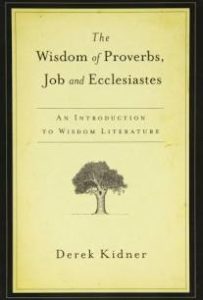
Derek Kidner
Recommendation: 4/5
Description of author: Derek Kidner, formerly warden of Tyndale House, Cambridge, has written many commentaries on OT books.
Comments: This introduction to Biblical wisdom literature devotes two chapters to each of the wisdom books (Proverbs, Job & Ecclesiastes) with an introductory chapter and a concluding chapter that compares, contrasts and integrates the three books. It also includes three appendices on non-Biblical wisdom literature, a short bibliography, a scripture index, an author index, and a general index. In the first chapter of each section (2, 4, 6), Kidner overviews the structure and the themes of each book. These chapters are thought provoking and very helpful. The second chapter of each section (3, 5, 7) overviews current Biblical scholarship in relation to each book. These chapters are wearisome at best. I suppose from a scholarly point of view it is good to have a sense for what is being written out there in the world. But I must confess that I have less and less tolerance or concern for what unbelievers think about who wrote a Biblical book, when they wrote it, and what they meant. For example, why can’t we just take Ecclesiastes 1:1 and 1:12 at face value? If we do, it is obvious that Solomon wrote the book since he is the only son of David that ruled over all of Israel in Jerusalem. But I realize that Biblical scholars will label me naïve and ignorant since any Hebrew scholar can see that the style is not Solomon’s and the vocabulary is from a much later period of Hebrew. But alas these things are not conclusive and I (naively) prefer to trust the infallibility of God’s Word (2 Timothy 3:16; Titus 1:2) rather than the musings of men using literary analysis well over 2,000 years after the writing of the book. I do not say that such literary analysis has no place in studying the Biblical literature, I simply would argue that the conclusions of such analysis (which are always tentative and always shifting anyway) can never overthrow what the text plainly says. On the whole this book is an excellent introduction to this very rich and difficult part of Scripture.